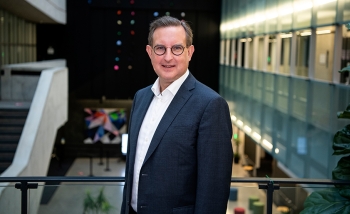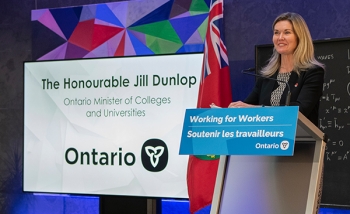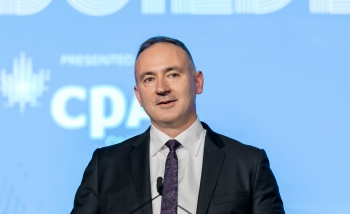Robert Myers s’est vu décerner la Médaille pour l’ensemble des réalisations en physique 2023 de l’ACP. Membre fondateur de l’Institut Périmètre et directeur de l’établissement depuis 2019, il a apporté d’importantes contributions à la théorie quantique des champs et à la gravité quantique tout au long de sa carrière.
« Myers est non seulement un scientifique exceptionnel qui a joué un rôle de pionnier en physique théorique, mais aussi un leader qui a transformé le paysage de la physique théorique au Canada », souligne Arthur McDonald, titulaire de la chaire Gray émérite à l’Université Queen’s et lauréat du prix Nobel en 2015.
Les recherches de Myers ont repoussé les limites du domaine et ouvert de nouvelles perspectives qui continuent d’alimenter des avancées en physique fondamentale.
« Myers a apporté des contributions révolutionnaires dans plusieurs domaines de la physique théorique, principalement dans la quête de l’unification entre la théorie quantique et la relativité générale d’Einstein. Certains de ses résultats, comme l’“effet Myers” et la cosmologie à dilaton linéaire, font aujourd’hui partie des manuels de physique », a déclaré l’ACP dans un communiqué de presse.
« Il a également enrichi notre compréhension de la correspondance AdS/CFT, un lien entre la théorie quantique des champs et la gravité en dimensions supérieures. Grâce à cette correspondance, il a appliqué des méthodes “holographiques” pour mieux comprendre la chromodynamique quantique, la théorie de l’interaction nucléaire forte. De plus, il a été le premier à établir rigoureusement la dérivation de l’entropie d’intrication holographique et à clarifier la signification des théorèmes-c en théorie quantique des champs. Son travail a contribué au lancement d’un programme de recherche international florissant. »
Tout au long de sa carrière, Myers a été largement reconnu par ses pairs. Il a notamment reçu la médaille Herzberg de l’ACP (1999), le prix CAP-CRM en physique mathématique et théorique (2005), la médaille CAP-TRIUMF Vogt (2012) et la médaille du jubilé de diamant de la reine Elizabeth II (2013). Il a été élu membre de la Société royale du Canada en 2006 et a figuré cinq fois parmi les « scientifiques les plus influents du monde » dans les rapports annuels de Clarivate Analytics/Thomson Reuters depuis 2014.
En plus de son parcours exceptionnel en recherche, Myers a contribué à renforcer le rôle du Canada dans la physique théorique à l’échelle mondiale. Premier chercheur à rejoindre l’Institut Périmètre en 2001, il a immédiatement perçu l’opportunité de bâtir un centre unique en son genre. À mesure que l’Institut prenait de l’ampleur, Myers a joué un rôle clé dans son développement : directeur scientifique de 2007 à 2008, président du corps professoral de 2011 à 2018, et directeur de l’Institut depuis 2019.
Dans ces différents rôles, il a renforcé la physique théorique au Canada en créant des partenariats avec des centres de recherche et des universités, en encourageant des nominations conjointes, en organisant des conférences influentes et en initiant des collaborations à travers le pays. La Médaille pour l’ensemble des réalisations en physique de l’ACP récompense l’impact durable de ses efforts dans la transformation du paysage canadien de la physique théorique.
« J’ai eu la chance, au cours de ma carrière, de pouvoir suivre ma passion pour la physique fondamentale et de travailler avec des collègues, des postdoctorants et des étudiants exceptionnels. J’ai eu une double chance en contribuant à la construction de l’Institut Périmètre. Je suis honoré de recevoir cette distinction de l’ACP », déclare Myers.
À propos de l’IP
L'Institut Périmètre est le plus grand centre de recherche en physique théorique au monde. Fondé en 1999, cet institut indépendant vise à favoriser les percées dans la compréhension fondamentale de notre univers, des plus infimes particules au cosmos tout entier. Les recherches effectuées à l’Institut Périmètre reposent sur l'idée que la science fondamentale fait progresser le savoir humain et catalyse l'innovation, et que la physique théorique d'aujourd'hui est la technologie de demain. Situé dans la région de Waterloo, cet établissement sans but lucratif met de l'avant un partenariat public-privé unique en son genre avec entre autres les gouvernements de l'Ontario et du Canada. Il facilite la recherche de pointe, forme la prochaine génération de pionniers de la science et communique le pouvoir de la physique grâce à des programmes primés d'éducation et de vulgarisation.
Ceci pourrait vous intéresser


L’Ontario investit dans l’Institut Périmètre pour alimenter la recherche fondamentale et l’innovation
novembre 9, 2021

